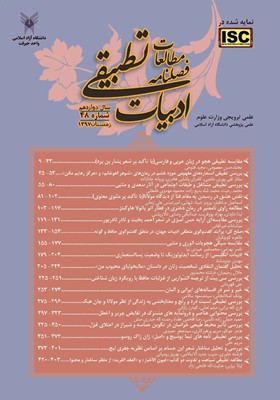«صلحِ کل» برآیند گفتوگوی منطقی ادبیات جهان، در منطق گفتوگوی حافظ و گوته
محورهای موضوعی : شعر
1 - عضو هیأت علمی دانشگاه پیام نور کرمانشاه
کلید واژه:
چکیده مقاله :
اوج آشتی دو فرهنگ و زبان را در دلبستگی گوته آلمانی به حافظ ایرانی میتوان یافت. گوته در دوران پختگی روح، چنان سرسپرده اندیشه قوامیافته حافظ شد که توانست رویکردی تعامل گرایانه را در پیش بگیرد و بارها با افتخار از این سرسپردگی دم زند؛ مناسبات ادبی ایران و آلمان به حافظ و گوته ختم نمیشود؛ اما شکوه این گفتوگوی منطقی را در ارتباط این دو اندیشمند بزرگ، فرای زمانها و مکانها میتوان جستوجو کرد. گوته برای نخستین بار مبحث ادبیات جهان را مطرح کرد و نظریه منطق گفتوگو را نیز باختین مطرح کرد؛ ایجاد ارتباط یک گفتار با گفتارهای دیگر برای حذف تک آوایی؛ و ژولیا کریستوا این مفهوم را به ارتباط بین متون و گفتمانهای ادبی گسترش داد. این پژوهش بر آن است تا ضمن بررسی گفتوگوی حافظ و گوته به عنوان سمبل شرق و غرب و تحلیل نظریه ادبیاتِ جهان در این زمینه، به تبیین تأثیر این گفتوگو در شکل گیری گفتمانهای مثبت جهانی بپردازد؛ بدین وسیله نقش گفتوگوی منطقی بین متون و همچنین گفتمانهای ادبی در ایجاد تفاهم و صلح ملل با توجه به ارج نهادن به شباهتها و مدارای با تفاوتها به صورت قابل تأملی برجسته خواهد شد. این مقاله با رویکردی تحلیلی، تطبیقی و انتقادی به این موضوع پرداخته است.
The extreme form of cultural peace and affection among two nations can be found in Goethe’s love towards Hafez. In his spiritual maturity, Goethe was so infatuated by Hafez’s well established thought that he could choose an interactive approach and frequently talked about this infatuation. Literary relationships between Iran and Germany are not confined to Hafez and Goethe, but the magnificence of the logical dialogue between them stands outside time and place. Goethe introduced the idea of the world literature for the first time; Bakhtin offered dialogism, the relationship of a speech to another one to omit monologism; and Julia Kristeva developed this concept to the relation between texts and literary discourses. This study aims to review Hafez and Goethe’s dialogue as a symbol of east and west and analyze the world literature theory from one hand and study the effect of this dialogue in constituting positive global discourses on the other. In so doing, the role of logical dialogue among texts and discourses is highlighted to create a universal peace and understanding, to glorify the similarities and respect the differences leniently. This study deals with this idea analytically, comparatively and critically.
احمدی، بابک. 1389ش، ساختار و تأویل متن، چاپ نهم، تهران: نشر مرکز.
آلن، گراهام. 1380ش، بینامتنیت، پیام یزدانجو، چاپ اول، تهران: نشر مرکز.
باختین، میخاییل. 1387ش، تخیل مکالمهای، ترجمه رؤیا پورآذر، چاپ اول، تهران: نشر نی.
حافظ شیرازی، خواجه شمس الدین محمد. 1377ش، دیوان حافظ، به کوشش خلیل خطیب رهبر، چاپ بیست و دوم، تهران: انتشارات صفی علیشاه.
کاظمی، ایرج. 1381ش، حافظ در اندیشه حافظ شناسان، چاپ اول، تهران: انتشارات افلاک.
گوته، یوهان ولفگانگ فون. 1392ش، دیوان شرقی- غربی، ترجمه محمود حدادی، چاپ دوم، تهران: کتاب پارسه.
لورکه، اسکار. 1958م، مجموعه آثار، چاپ انتشارات زوکامپ هامبورگ.
کتب لاتین
Darosh, Divid(2003), what is word literature? Princeton and oxford: princetonuniversity press.
Romdenh-Romlue(2011), Routledge philosophy Guide book to Merleau –ponty, London: Routledge.
Linell, Per(2008), Essential of dialogism, Sweden. Department of communication studes Linkoping university.
مقالات
انوشیروانی، علی رضا. 1390ش، «ادبیات جهان، از اندیشه تا نظریه»، مجله ادبیات تطبیقی، بهار، پیاپی .3
تائبی نقندری، زهره. 1392ش، «حافظ از دو نگاه: رمانتیسم گوته و تعالی گرایی امرسن»، ادبیات تطبیقی(فرهنگستان زبان و ادب فارسی)، پیاپی 8(پاییز و زمستان 1392).
حدادی، سید محمد. 1393ش، «رنجنامه گوته، پژواک کلام حافظ، تحلیل بر رنج نامه، دیوان غربی- شرقی یوهان ولفگانگ فن گوته»، مجله تاریخ ادبیات شماره 3/74.
سلیمانی، فرانک. 1388ش، «جلوههای صلح و بشر دوستی در اشعار مولانا، حافظ و سعدی»، نشریه امداد و نجات، دوره 1، شماره 3.
عظیمی، حسین و علیا، مسعود. 1393ش، «نسبت متن و صدای دیگری در اندیشه باختین»، کیمیای هنر، سال سوم، شماره 13.
نکوروح، حسن. 1389ش، «تأثیر غزل حافظ در دیوان شرقی- غربی»، ویژه نامه فرهنگستان، بهار، شماره 1.
_||_
Ahmadi, Babak (2010), Structure and Interpretation of Text, Tehran, Ninth Edition, Center Publishing.
Allen, Graham (2001), Intertextuality, Yazdanjou's Message, Tehran, First Edition, Center Publishing.
Anushirvani, Ali Reza (2011), World Literature, From Thought to Theory, Comparative Literature Magazine, Spring, Successive.
Bakhtin, Mikhail (2008), Conversational Imagination, Translation by Roya Pourazar, First Edition, Release.
Ta'bei, Nahandari, Zohreh (1392), Hafez from Two Look: Goethe Romanticism and Emerson's Excellence, Adaptive Literature (Persian Language and Literature Academy), Series 8 (Autumn and Winter 2013).
Hafez (1998), Divan Khajeh Shamsuddin Mohammad Hafez Shirazi, By Khalil Khatib Leader, Twenty-Second Edition, Safi Alishah Publications, Tehran.
Haddadi, Seyyed Mohammad (1393), Goethe Rangnit, Hafez's Echoes of Hearing, An Analysis on the Rabid, The Oriental Western Guard of Johann Wolfgang von Goethe, The Journal of the History of Literature No. 3/74.
Soleimani, Frank (2009), The Effects of Peace and Humanity in the Poems of Rumi, Hafez and Saadi, Journal of Rescue and Rescue, Volume 1, Issue 3.
Azimi, Hossein, Ali, Masoud, (1393), The Relationship between Text and Sound in Bakhtin's Thoughts, Kimia Art, Third Year, No. 13.
Kazemi, Iraj (2002), Hafez in the Thought of Hafezologists, Tehran, First Edition, Aflak Publications.
Goethe, Johann Wolfgang von (1392), Eastern and Western Divan, translated by Mahmoud Haddadi, Second Edition, Parseh Book.
Lorque, Oscar, (1958), Collection of Works, published by the Zukump Publishing House of Hamburg.
Nekoorouh, Hasan (2010), The Effect of Hafez's Ghazal in the Western Eastern Divan, Special Edition of the Academy, Spring, No. 1.
Darosh, Divid, what is word literature? Princeton and oxford: princetonuniversity press,2003.
Romdenh-Romlue.(2011),Routledge philosophy Guide book to Merleau –ponty, London: Routledge.
Linell,Per,(2008), Essential of dialogism, Sweden. Department of communication studes Linkoping university.

